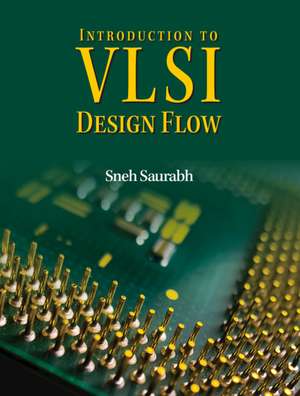Introduction to VLSI Design Flow
Autor Sneh Saurabhen Limba Engleză Paperback – 14 iun 2023
Preț: 598.82 lei
Preț vechi: 672.83 lei
-11% Nou
Puncte Express: 898
Preț estimativ în valută:
114.60€ • 118.39$ • 95.38£
114.60€ • 118.39$ • 95.38£
Carte tipărită la comandă
Livrare economică 25 martie-08 aprilie
Preluare comenzi: 021 569.72.76
Specificații
ISBN-13: 9781009200813
ISBN-10: 100920081X
Pagini: 800
Dimensiuni: 183 x 241 x 28 mm
Greutate: 0.95 kg
Editura: Cambridge University Press
Colecția Cambridge University Press
Locul publicării:Cambridge, United Kingdom
ISBN-10: 100920081X
Pagini: 800
Dimensiuni: 183 x 241 x 28 mm
Greutate: 0.95 kg
Editura: Cambridge University Press
Colecția Cambridge University Press
Locul publicării:Cambridge, United Kingdom
Cuprins
Part I. Overview of VLSI Design Flow: Chapter 1. Foundation; Chapter 2. Introduction to Integrated Circuits; Chapter 3. Pre-RTL Methodologies; Chapter 4. RTL to GDS Implementation Flow; Chapter 5. Verification Techniques; Chapter 6. Testing Techniques; Chapter 7. Post-GDS Processes; Part II. Logic Design: Chapter 8. Modeling Hardware using Verilog; Chapter 9. Simulation-based Verification; Chapter 10. RTL Synthesis; Chapter 11. Formal Verification, Chapter 12. Logic Optimization; Chapter 13. Technology Library; Chapter 14. Static Timing Analysis; Chapter 15. Constraints; Chapter 16. Technology Mapping; Chapter 17. Timing-driven Optimizations; Chapter 18. Power Analysis; Chapter 19. Power-driven Optimizations; Part III. Design for Testability (DFT): Chapter 20. Basics of DFT; Chapter 21. Scan Design; Chapter 22. Automatic Test Pattern Generation (ATPG); Chapter 23. Built-in Self-test (BIST); Part IV. Physical Design: Chapter 24. Basic Concepts for Physical Design; Chapter 25. Chip Planning; Chapter 26. Placement; Chapter 27. Clock Tree Synthesis (CTS); Chapter 28. Routing; Chapter 29. Physical Verification and Signoff; Chapter 30. Post-silicon Validation.
Notă biografică
Descriere
A textbook on the fundamentals of VLSI design flow, covering the various stages of design implementation, verification, and testing.
